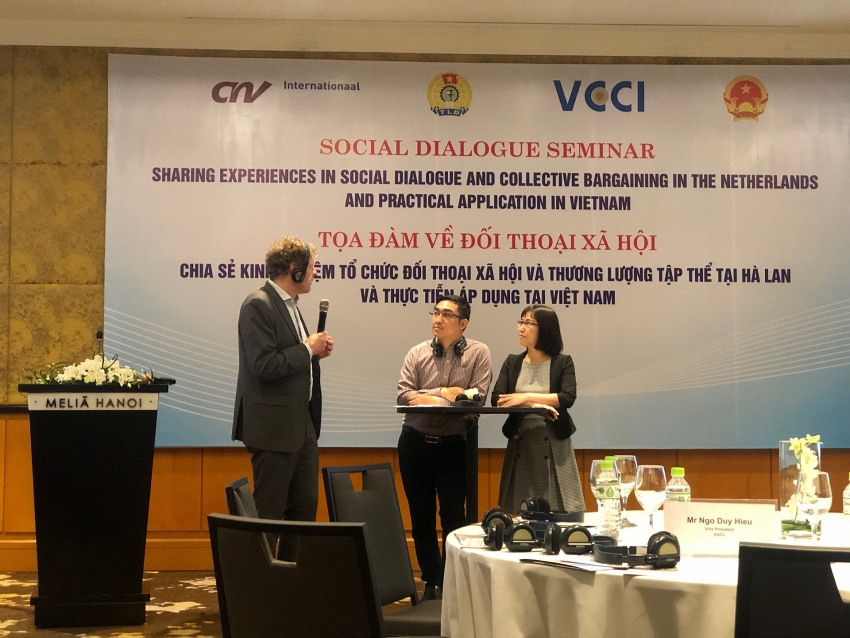Dutch experience in social dialogue hoped to solve local strikes
 |
| The seminar on social dialogue was organised in the afternoon of April 10 |
The pilot project was officially kicked off in the garment industry in the northern city of Hung Yen, the southern city of Dong Nai, and Ho Chi Minh City. The project will focus on training representatives of employers and labourers about starting an effective social dialogue.
According to the Dutch Trade Union, the project will provide models of multi-company social dialogue and collective bargaining that can be replicated or expanded to other industries.
At the seminar titled “Sharing experiences in social dialogue and collective bargaining in the Netherlands and practical application in Vietnam” in the afternoon of April 10, Willem Jelle Berg, vice chairman of CNV International, shared experiences from the Dutch social dialogue project. Jelle highlighted that social dialogue in the Netherlands features not only employers and employees, but trade unions, the government, and other relevant (social) organisations, which is quite different from how things work in Vietnam.
“Social dialogue is a process which needs efforts and attention every day. It is fragile sometimes. Results which are achieved may be lost. In addition, social dialogue is a continuous process and is built on efforts from all parties involved,” said Berg. “Trade unions need to be up-to-date, well informed, and well-equipped to be able to put real issues on the table and to obtain results in negotiations.”
Berg also said that focusing on resolving difficulties related to gender-based violence and the minimum wage are very necessary for social dialogue between employers and employees.
| Gender-based violence and the living wage are also a major reason behind hundreds of strikes across the country. According to the VGCL, there were 217 strikes over the country last year, down 35 per cent on-year. The VGCL also stated that strikes in foreign-invested companies accounted for the majority. |
Nguyen Vinh Quang, head of the VGCL’s Labour Relations Department said, “Our survey showed that some companies still force employees to work overtime more than 1,000 hours per year, while the law stipulates the maximum of 200-300 hours per year.”
Regarding the issue, Catelene Passchier, vice chairman of the Netherlands Trade Union Confederation, told VIR that many types of research in the world pointed out that more working hours will have less productivity. Therefore, it is imperative to find ways to reduce corporations’ dependence on labour. In this situation, effective social dialogue plays an important role to help both sides jointly find solutions for their problems and ensuring mutual benefits.
At the seminar, representatives of the International Labour Organisation (ILO), the Vietnam Chamber of Commerce and Industry (VCCI), the Dutch Trade Union, and related members affirmed that effective social dialogue benefits the sides by reducing disputes and strikes, creating better attachment between skilled labourers and companies, stabilising the number of labourers at companies, and improving mutual understanding between employers and labourers. The benefits will help issue actual solutions to resolve corporations’ problems.
| Fourth Industrial Revolution threatening Vietnamese labourers Female workers still barred from some jobs MoLISA targets to take 110,000 labourers abroad |
What the stars mean:
★ Poor ★ ★ Promising ★★★ Good ★★★★ Very good ★★★★★ Exceptional
Related Contents
Latest News
More News
- NAB Innovation Centre underscores Vietnam’s appeal for tech investment (January 30, 2026 | 11:16)
- Vietnam moves towards market-based fuel management with E10 rollout (January 30, 2026 | 11:10)
- Vietnam startup funding enters a period of capital reset (January 30, 2026 | 11:06)
- Vietnam strengthens public debt management with World Bank and IMF (January 30, 2026 | 11:00)
- PM inspects APEC 2027 project progress in An Giang province (January 29, 2026 | 09:00)
- Vietnam among the world’s top 15 trading nations (January 28, 2026 | 17:12)
- Vietnam accelerates preparations for arbitration centre linked to new financial hub (January 28, 2026 | 17:09)
- Vietnam's IPO market on recovery trajectory (January 28, 2026 | 17:04)
- Digital economy takes centre stage in Vietnam’s new growth model (January 28, 2026 | 11:43)
- EU Council president to visit Vietnam amid partnership upgrade (January 28, 2026 | 11:00)

 Tag:
Tag:
























 Mobile Version
Mobile Version